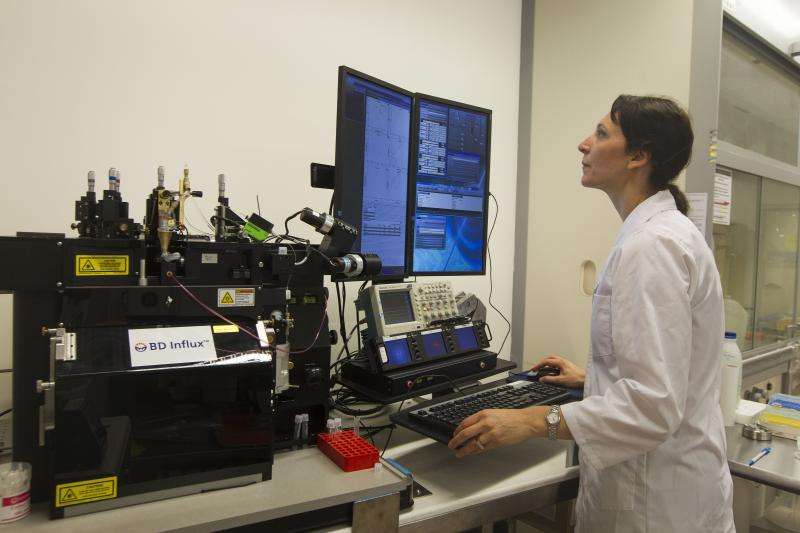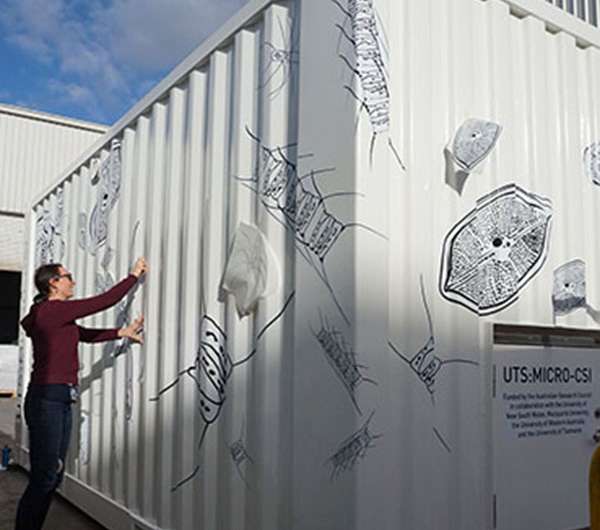Frontier science in ocean-going lab

Oceanographer Dr Martina Doblin is preparing for one of the most significant explorations of her career. In early June, a mobile laboratory known as the Micro-CSI will leave from Brisbane aboard Australia's new ocean research vessel Investigator on a two-week journey to Sydney.
It will be the maiden voyage of Dr Doblin's research project to develop the "lab-in-a-box" and will give her unique access to the marine environment that is her special area of investigation. The purpose-designed laboratory – essentially a custom-fitted shipping container – will allow scientists to investigate living microbes next to their ocean habitats, rather than wait until they're on dry land.
"Until now, we've been forced to bring samples back to our land-based laboratories, and to do that effectively we've had to preserve them," says Dr Doblin, an Associate Professor in the Plant Functional Biology and Climate Change Cluster at the University of Technology, Sydney (UTS).
"With the new lab we have a chance to examine the activity of living cells and manipulate them in particular ways, to understand what their resilience is to ocean changes … we're able to characterise their activity much better. As a consequence it will give us a better understanding of their role in the ocean."
The Tasman Sea is of particular interest to Dr Doblin and her colleagues because it is heating up faster than other ocean regions due to the effect of the East Australian Current.
"The question we're asking is, how does the base of the food web respond to physical processes along the continental shelf edge," says Dr Doblin.
"Our continental margins are the most productive part of our ocean habitats … we want to understand why that is; what are the physical processes that make them so fertile relative to other parts of Australia's seascape?"
The Micro-CSI lab is a collaboration involving several universities as well as the Marine National Facility, which manages the 94-metre Investigator. The $120 million ship was completed last year and will make its first visit to Sydney next month, mooring at Garden Island. It can travel 10,000 nautical miles in a single voyage, carrying up to 40 scientists and support staff, from the equator to the edge of the Antarctic ice.
"The selling point for all the partner universities is having a platform to do specialised research on the microscopic planktonic organisms that help regulate the Earth's biosphere," says Dr Doblin, who is lead investigator and chair of the Micro-CSI steering committee.
"It's of great interest to us as researchers but it also has relevance to the wider public because these organisms affect the way the oceans take up carbon dioxide."

Dr Doblin says Australia's marine industries and increasing human activity in the coastal zone make a compelling case for the research the lab-in-a-box will allow.
"Unless we really understand what those microbes are doing, we have no way of telling how their ecosystem functions will be affected if we change the environment," she says.
"If we're going to manage marine resources and allow economic growth to give people jobs, we as ocean researchers need to be able to do the research that says 'here are the limits'.
"We need to be able to quantify what these microbes can do under normal conditions and then, for example, if there's an oil spill, how much that function might diminish."
Dr Doblin says the ocean-going laboratory will allow researchers to "ask questions that we've never before been able to answer".
"The challenge is to project forward in time. When we take the laboratory out to sea in June, what I want to quantify is whether the microorganisms in the East Australian Current have a greater tolerance of high temperatures … what is their capacity to keep functioning in the rapidly warming water?"
Professor Gustaaf Hallegraeff, of the Institute for Marine and Antarctic Studies at the University of Tasmania, says the potential offered by the ocean-going container lab ranks with other technological milestones in the study of microscopic marine organisms.
"Whenever we've had a major technological breakthrough, there have been advances in our knowledge – in the 1970s with the electron microscope, for example, and in the 1990s with molecular sequencing," says Professor Hallegraeff.
However, the genetic and taxonomic database of microscopic plankton is far from complete. "To date, we still don't know more than about 60 per cent," he says. "And the focus has tended to be on bigger organisms rather than bacteria-sized picoplankton."
The Micro-CSI gives scientists at universities in Australia an exciting and novel approach to investigate what could be the "most important category of organisms in the open ocean", says Professor Hallegraeff.
The minimalist layout of the container's interior, realised by a Tasmanian construction company that has built other container labs, allows scientists to wheel their instruments on and off the ship. Equipment fixed on mobile trolleys can be used in a land-based lab or at sea, where everything in the mini laboratory locks into place.
The innovation also extends to graphic marine markings on the container's exterior that will give the Micro-CSI a distinctive oceanographic look. Artist Dr Lisa Roberts leads the Living Data program at UTS, working with designer and curator An Marosszeky to communicate climate change research. Dr Roberts and Marosszeky collaborated with Dr Doblin to produce a series of 2D decals of phytoplankton for application to the container's exterior.
"Microscopic organisms have a profound influence over the planet, they interact strongly with human health – and they're beautiful. It's a really fun way to get inspired," says Dr Doblin.
Dr Roberts says collaboration between scientists and artists can help to "raise awareness of our connection to the natural world".
"It's not contrived. It's just coming out of our genuine curiosity and desire to understand that things are changing and that we need to adapt too and change the way we're doing things."
Provided by University of Technology, Sydney



















